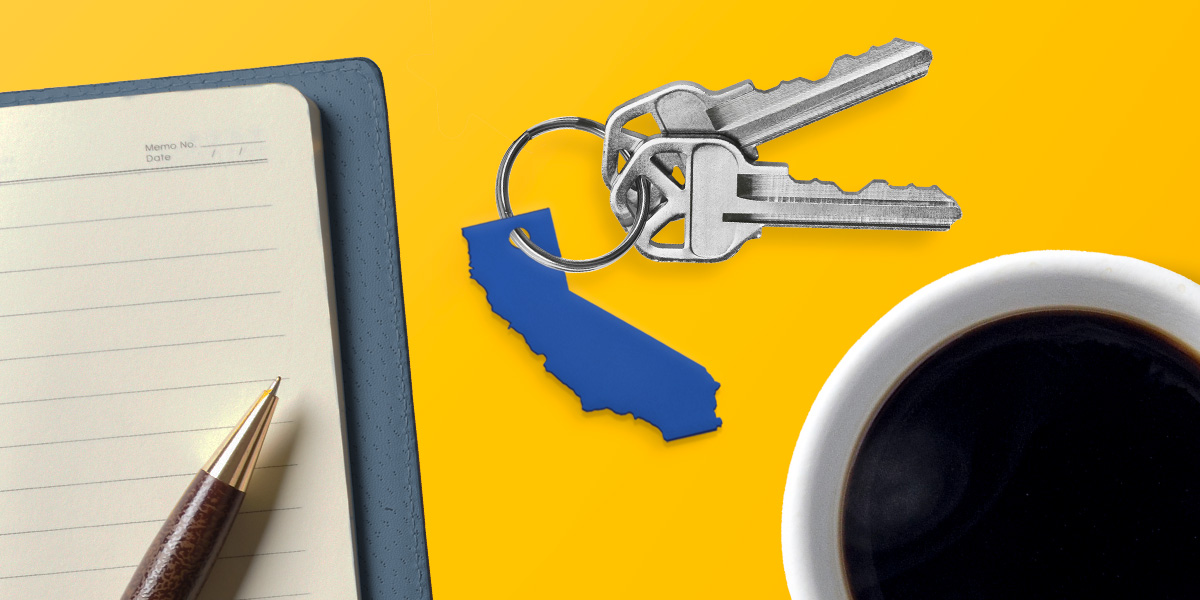-
Personal Banking -
Insights
What Is Escrow & How It Works
If you're an aspiring homebuyer, it's likely that you've heard the word "escrow." But you might not understand exactly what it means. Or you might be selling your home and have learned that your funds could be tied up "in escrow" until the sale is finalized — but you're not sure where that leaves you.
Escrow is an important part of the homebuying process, one that is designed to safeguard your interests and provide a secure framework for completing what is likely to be one of the largest and most important financial transactions of your lifetime.
Instead of having buyers and sellers exchange funds or property directly, which could be risky, the real estate industry protects participants in many states by using third-party escrow accounts to hold the funds, documents and assets in the transaction until certain conditions are met. This process is meant to ensure a smooth and fair exchange between the buyer and seller.
In addition, escrow refers to an account held by your mortgage lender to pay certain costs associated with homeownership.
What is an Escrow Account?
The term escrow is used in a few different contexts for real estate transactions. The most common uses of escrow accounts in the context of real estate are for two types of accounts: one for homebuying and one for taxes and insurance. In some parts of the United States, escrow accounts are referred to as impound accounts.
Escrow Accounts for Homebuying
When purchasing a home, buyers provide a “good faith” or “earnest money” deposit to show the sellers they’re serious about the purchase. The funds are deposited into a neutral, third-party account — the escrow account — for the time period until the transaction closes. This ensures that the seller receives the deposit for the property and the buyer receives the title to the property, free and clear of any liens.
The funds stay in the escrow account until the sale closing unless the transaction falls through. In that case, the funds are kept by the seller or returned to the buyer depending on the reason the contract isn’t completed.
When someone says a home "is in escrow" or “under contract” it generally means that both parties have agreed to a sale and the process is in its final stages. Escrow accounts are used for closings in about half of the states in the U.S., with each state having varying requirements for he closing process.
Escrow Accounts for Homeowners - Taxes & Insurance
Escrow accounts are also used by lenders to hold the borrower's money to cover taxes and insurance costs, including homeowner’s insurance and, if applicable, private mortgage insurance. These types of escrow accounts are commonly called mortgage escrow accounts since they are built into a homeowner's monthly mortgage payment.
In states where escrow accounts are used for closings, loans have "impound" accounts for the payment of taxes and insurance. But the purpose of the account is the same, regardless of what it is called.
A portion of the borrower's monthly mortgage payment is deposited into this account, and when taxes and insurance bills are due, the lender uses those funds to make the payment on behalf of the borrower. Ensuring these essential expenses are covered reduces the lenders' risk of lapsed coverage or unpaid taxes.
Since taxes and insurance costs fluctuate, it's up to the lender, or the company that manages an existing mortgage, to make sure they are holding the appropriate amount of funding for the account. The amount paid into an escrow account (and the corresponding monthly mortgage payment) can change if the taxes or insurance charges change.
The Purpose of an Escrow Account
As mentioned above, escrow accounts are used to ensure good faith during the process of selling a property. An escrow account provides a secure and impartial way to protect both buyer and seller during a transaction by not releasing the funds until all conditions have been met.
This can help prevent fraud, mismanagement and other problems that can arise.
For taxes and insurance, escrow accounts help protect lenders and homeowners from risk that occurs if taxes and insurance aren't properly paid. They also make the process of paying these fluctuating annual costs more seamless and simpler for borrowers.
How Does Escrow Work?
If you’re buying a home, an escrow account is a static account held by a third party that holds funds you deposit until the closing.
An escrow account for homeowners is slightly more complicated but serves a similar purpose – third party control of funds until they’re needed. In this case, your loan servicer holds funds for your homeowner’s insurance and property taxes until those bills are due. If you are paying private mortgage insurance on your loan, those funds are also held by the lender for payment to the private mortgage insurance provider. In addition, if you have a special insurance policy for your home such as flood insurance or wildfire insurance, funds to pay those premiums can be collected in an escrow account.
The funds are separated from your monthly mortgage payment and kept in your escrow account. Your loan servicer directly receives your property tax and insurance bills and automatically pays them.
In addition, your loan servicer will audit your escrow account annually to evaluate whether the right amount of money is being collected from you. You may receive a refund if you’ve overpaid, or your monthly loan payment could be increased if you’ve underpaid. Your lender may also ask you to make a one-time payment into your escrow account to cover the shortage. Since homeowner’s and private mortgage insurance premiums can change and so can property tax assessments, the amount collected for your escrow account is likely to be adjusted annually or every few years.
Who Manages an Escrow Account?
An escrow company or escrow agent can manage an account when you buy or sell a home. It's important to note that the escrow agent is a neutral third party with no ownership or control over the funds or assets.
Their role is to manage the funds per the agreement's terms and disburse them to the appropriate parties once all the conditions have been met.
The buyer, seller and lender must all agree to the terms of the escrow before placing funds into escrow.
Mortgage servicers handle escrow accounts (known as impound accounts in some states) that are meant to pay taxes and insurance.
Can Money Be Withdrawn from Escrow?
In general, money can only be withdrawn from an escrow account during a home purchase transaction with the consent and authorization of all parties involved, or per the agreed-upon escrow instructions.
When you’re a homeowner, the funds held in your lender’s escrow account typically cannot be withdrawn because the money is being held to pay your property taxes and insurance.
How Long Does Escrow Last?
The duration of an escrow period varies depending on the specific terms agreed upon by the parties involved. Some transactions close in 30 days, but they can range from a few weeks to a couple of months.
Homeowner escrow accounts typically last for the entire loan term, but that varies by lender and loan company. In some cases, particularly if the homeowners have significant equity in their home, a mortgage company will allow the homeowners to cancel their escrow account. In that case, the homeowners would be responsible for direct payment of property taxes and homeowner’s insurance.
When you pay off your mortgage entirely, you won’t have an escrow account and will need to pay taxes and insurance on your own.
How is My Escrow Payment Calculated?
When you’re buying a home, the escrow amount is your earnest money deposit.
Once you're a homeowner, your mortgage company will calculate the monthly escrow payment that is part of your mortgage payment. This sum is calculated by determining your annual property tax assessment and your homeowner’s insurance costs for 12 months. If you pay private mortgage insurance or have a separate flood or wildfire insurance policy, those premiums are also calculated on an annual basis. Once all those costs are added together, the lender divides the total by 12 to calculate your monthly payments.
Many lenders require an initial cushion of up to two months' worth of escrow payments at your closing to be certain you have enough money set aside for taxes and insurance.
Since those premiums and tax bills can change, your escrow payment will be reviewed and recalculated annually.
What Are Escrow Fees?
Escrow fees for a home purchase transaction are charges associated with the services provided by an escrow agent or company. These fees cover administrative tasks, document handling and managing funds or assets in the account. The specific amount varies based on the value of the transaction and the complexity of the agreement.
Typically, lenders do not charge fees for an escrow account associated with a mortgage.
What Happens When a Home is in Escrow?
When a home is “in escrow” or “under contract,” it typically means that both parties have agreed to the general terms for the sale of a house and that the final steps for completing the sale are in motion. This is when the neutral third party steps in to manage the funds in an escrow account until the sale is completed.
Things that might happen when a home is in escrow include:
- Appraisals.
- Home, pest, environmental and other types of inspections.
- Notifications of any issues discovered during inspections.
- Finalization of financing terms after pre-approval.
- Securing the title report, which is a report that guarantees the property is lien-free and ready to be sold.
- A final walkthrough to identify any new damage that might have occurred during the escrow process.
The actual steps that occur during your escrow process will vary based on local laws, the terms of your sale and your lender's requirements.
What Does Escrow Not Cover?
Escrow accounts typically do not cover homeowner association or condominium association dues, which means you’re responsible for those payments separately. Sometimes associations have special assessments for specific projects and those fees would also not be covered by an escrow account.
In addition, utility bills are not covered by escrow accounts.
The Pros of Using Escrow
When you buy a home, an escrow account provides protection for your deposit until the transaction closes. A third-party escrow agent keeps the money until all aspects of the purchase contract are completed.
There are several advantages to an escrow account when you’re a homeowner:
- You set aside the funds for your taxes and insurance incrementally rather than as a lump sum.
- You only have one monthly mortgage bill to pay rather than managing several types of housing payments.
- Your lender is responsible for paying your taxes and insurance on time.
- If your taxes or insurance are higher, your lender might cover the bill and adjusts your monthly payment.
The Cons of Using Escrow
While an escrow account can be convenient, there are some drawbacks:
- Your monthly mortgage payment is higher with the addition of escrow payments on top of your principal and interest payment.
- Your upfront costs at the closing are higher when they include several months of escrow payments.
- Your lender holds your funds until the bills are due, which means you can’t access the money for other uses.
- You may be missing out on interest or profits from investments on your money while it is sitting in the escrow account.
- Your monthly mortgage payment may change as taxes and insurance premiums change.
Can You Purchase a Home Without Escrow?
Whether closings are handled with or without escrow is dependent on the state law and local custom. In other words, consumers don't get to choose whether escrow is involved with their closing process.
While the rules vary, homeowners can sometimes request an escrow waiver when they have paid their mortgage on time for a year or longer and when they have at least 20% in home equity.
Conventional loans with private mortgage insurance and FHA loans require escrow accounts. Typically, homes that require flood insurance also require an escrow account.
This article is for general information and education only. It is provided as a courtesy to the clients and friends of City National Bank (City National). City National does not warrant that it is accurate or complete. Opinions expressed and estimates or projections given are those of the authors or persons quoted as of the date of the article with no obligation to update or notify of inaccuracy or change. This article may not be reproduced, distributed or further published by any person without the written consent of City National. Please cite source when quoting.
City National, its managed affiliates and subsidiaries, as a matter of policy, do not give tax, accounting, regulatory, or legal advice, and any information provided should not be construed as such. Rules in the areas of law, tax, and accounting are subject to change and open to varying interpretations. Any strategies discussed in this document were not intended to be used, and cannot be used for the purpose of avoiding any tax penalties that may be imposed. You should consult with your other advisors on the tax, accounting and legal implications of actions you may take based on any strategies or information presented taking into account your own particular circumstances.
Loans and lines of credit are subject to credit and property approval. Additional terms and conditions apply. Not all applicants will qualify. Home equity lines of credit are not available in Texas.




